Joker press conference with Joaquin Phoenix, Todd Phillips, Zazie Beetz and Emma Tillinger at Venice Film Festival 2019
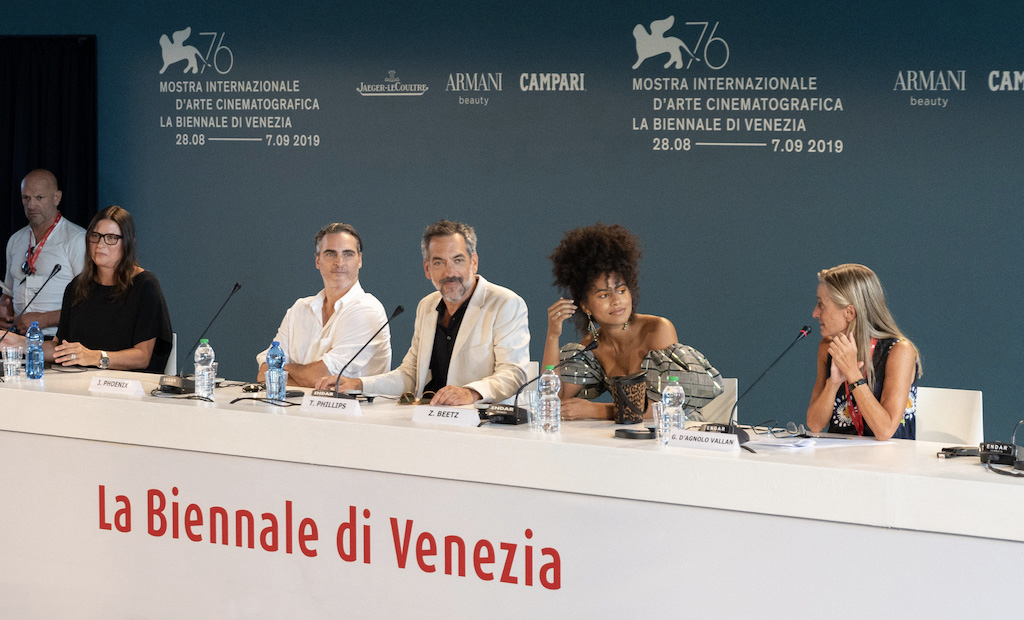
Joker is the latest film from Todd Phillips starring Joaquin Phoenix in a character study of a man struggling to find his way in Gotham City’s fractured society.
Forever alone in a crowd, Arthur Fleck (Phoenix) longs for any light to shine on him. Trying his hand as a stand-up comic, he finds the joke always seems to be on him. Caught in a cyclical existence between apathy and cruelty and, ultimately, betrayal, Arthur makes one bad decision after another, bringing about a chain reaction of escalating events.
The director and cast presented the film with a press conference at the Venice Film Festival.
Todd, for some of the audience, this might not be the most obvious film for you to do, but it also feels like a Todd Phillips origin story as it’s a return to some of your strongest passions.
Todd Phillips: Yeah for sure, you’ve known me for 25 years in New York. I never really see the movie as that big of a departure for me personally; it’s different tonally from a lot of films I’ve done before. But ultimately it’s a kind of old storytelling, beginning-middle-end story. It’s inspired by the movies I grew up on, these character studies of the 70s. I kept thinking: all I came to do is a genre film in the comic book world, like that, really doing a deep dive on the character like Joker, with a great actor and great people behind it you can really do something special.
This is very different from superhero movies, especially DC ones. Could more movies like this become a valuable tool in the competition with Marvel?
TP: I don’t know about the competition with Marvel; I haven’t been in the comic book world. When we conceived this idea, initially, we wanted to take a different approach to this genre. Comic book movies are doing really well but we thought we could have an exciting approach to this genre. I don’t know what it means for DC, but I know it was a hard movie for us to get made, and to convince DC and Warner at first. But we kept pushing because we thought it would be really special. In all fairness, they took a bold swing with the movie and let us do whatever we wanted. We are very grateful for that.
Was it particularly attractive to write an origin story that was never in the comic?
TP: Yes there was a lot of freedom because The Joker is a character in the comic books that never really had an origin story. That was kind the fun. So we thought it was very liberating because there were no rules or boundaries. Scott and I pushed each other every day, coming up with something totally insane.
The Joker is becoming an American Hamlet, with several actors giving it their own interpretation. Did they inspire you and how much have you been influenced by the climate in which we are living?
JP: For me what attracted me to make this film is that we were going to approach it in our own way. So I didn’t refer to any past interpretation of the character. It just felt like something that was our interpretation and that’s what was really important for me.
TP: I just think, films are often mirrors of society, but they’re never moulders. We wrote it in 2017 so inevitably certain themes find their way into the movie that may exist now, although it’s set in the 70s/early 80s. It’s certainly not a political film but it depends on the lens you view it through.
Is the “ace in the hole” wording at the climax a reference to a past film? Did you use material from Jerry Robinson’s Joker?
TP: No. It’s funny how people find meanings we never meant, and found references that aren’t there.
What was fun about it was that we were able to pick and choose elements from past comic books. There’s a little bit of Killing Joe with the idea of a failed standup comedian. Another big thing that inspired the movie was the silent film The Man Who Laughed. It’s really where it started. The co-writer emailed me this morning and sent our first e-mail back and forth and it was all about The Man Who Laughed. I almost forgot about it in the process, how big the inspiration is.
One of the attractions of the film was that it was written with no boundaries no rules. Was it how you approached the character too?
JP: What was attractive about this character for me is that he is so hard to define. You don’t really want to define him. I was identifying with certain parts of his personality and motivations, then I would back away from it as I wanted some mystery. Whilst shooting, every day we would discover new aspects of this character, up until the very last day.
TP: The more clear thing it becomes for Joaquin, the less he responds to it. (JP says something) For this (film).
It feels like this development was born from a close collaboration between director and actor?
TP: We spent a lot of time, Joaquin and I, six months talking about the character, the script, the laugh, the voice, how he dresses, the hair, before we started shooting. We would go pretty deep into it, compared to the usual process. Then we started making the movie and it really never stopped. Even on the last day, we e wondered if we wanted to shoot again for three weeks as we loved it and kept finding things we wanted to dig into.
Zazie, your role is between reality and something that we are not sure of. How did you develop it and work together with Todd and Joaquin?
Zazie Beetz: The reality of the characters is up to interpretation. I would say, Todd and Joaquin had a close interactive relationship. I thought our collaboration was an honour and it was also kind of discovering as we were shooting as well – you know, kind of what does Arthur’s character need in terms of a catalyst for his development. How my character genuinely reacts to somebody like him and the grounded version of having a relationship with somebody like Arthur.
TP: One thing to say about Zazie is that nothing in the script got more messed around with than her character, from when she signed on to when we were shooting. She’s an amazing collaborative, we would present her with a new idea, and write about it for hours. She came in knowing her pages and I would be like: no we aren’t doing this. We changed the script and she was so down for that kind of improvisation. In comedy, we always tried things on the day, but for this movie, Zazzie came in to play every day, she was enthusiastic about the changes, helped with the dialogue, and it was a beautiful collaboration.
ZB: It felt very creative.
How did you choose the amount of violence in the film?
TP: As a director, you are the purveyor of tone. This film was written to be a slow burner, and violence is part of it. People think it’s a very violent movie but if you break it down to the number of people he has issues with… I think a movie like John Wick 3 has a much higher amount of violence, but the difference is that we try to paint it with a realistic brush and so when it comes it feels like a punch in the stomach. It’s all a balancing act of tone.
Joaquin, how did you prepare for the role, from both a physical and psychological standpoint?
JP: I didn’t get that. I’m glad you translated. I think the first thing was the weight loss. That’s where I started. Which affected my psychology as a result. You start to go mad when you lose that kind of weight in that amount of time. I started there with the script, talking with Todd. There’s a book about political assassins that I thought was very interesting, which breaks it down to different types of personalities doing those sorts of things. I didn’t identify Arthur as a particular type of personality but I also wanted the freedom to create something that wasn’t identifiable. This is a fictional character. I didn’t want a psychiatrist to be able to identify his type. Let’s step away from that and create what we want. There was this balance. I was given a journal/diary, and that was really helpful because I’d been there a couple of weeks, and I wasn’t sure where to start, and Todd sent this journal-
TP: An empty journal
JP: Yeah, and I didn’t know what to write, so I asked for suggestions, them after a few days I ignored the suggestions and started to write. I didn’t anticipate it would become an important part of the discovery of the character at that time.
One important character of the film is Gotham. For this, you brought in a producer associated with Martin Scorsese, Emma Tillinger. Can you talk a little bit about this world?
Emma Tillinger: Todd wanted to shoot in New York and evoke sort of the NYC vibe in the early 80s. The Times Square of that time. So we hired Mark Friedberg, a wonderful production designer who Todd worked with to execute that vision. With some great locations in and around the city.
TP: Emma is being shy. Because of her relationship with Scorsese, she has relationships with the greatest crews in New York. She also has the muscle to lean in the MTA, which is like the subway of New York to get the ability to shoot here. She did so much work for us to make it work in NYC and to get us a great crew. Mostly we shot in the Bronx for where Arthur lived, and some Newark, New Jersey, which still has a great vibe to it.
Joaquin, was the distinctive, constant laugh something you got coached for? What was it like working with De Niro?
JP: The laugh was actually from before we even read the script. Todd came over and talked about what he wanted and he showed this video and described the laughter as something almost painful. I thought that was a very interesting way to look at the Joker laugh and it felt like a new fresh way to look at it. Honestly, I didn’t think that I could do it, and I practised alone and then I asked Todd to come over to audition my laugh. I thought I had to be able to do it on the spot and in front of somebody else. It was uncomfortable because it took me a long time. I didn’t want to fake it, I had to find it, and he said: “please don’t do it”.
TP: (laughs) It was uncomfortable. I said, you know you have the part, right? But it was a process for him, finding that modulation. There are three kinds of laugh in the film: there’s the affliction laugh, then there’s the one where he’s trying to be one of the guys, and the laugh at the end: authentic joy.
The soundtrack is amazing. How was your relationship with the music, especially in the scene when you are dancing on the stairs?
TP: We had a great composer, Hildur Guðnadóttir, and I wanted her to do the movie. I asked her to write music off the script, it’s not normally done before sending fully shot scenes. Hildur was excited by the idea of writing music based on a screenplay. She would send me stuff every so often. One of the things we thought you were referring to, is when Arthur is dancing in the bathroom. In the script, he was supposed to be hiding in the bathroom, washing the makeup off etc… but every day we were changing things as we went along and one day, Joaquin and I were in the bathroom alone and we were thinking about hiding a gun and we thought: why would Arthur want to hide evidence? And after a bit, I played him the music from Hildur from the night before and he started the movement and it became that scene. It was a lot due to Hildur and her gorgeous cello work. It’s a simple but powerful score. It really defined that scene and helped us going forward.
JP: It was a really key transformative moment. When he started to become Joker, we wanted something to express that, some moment, and with Hildur’s music and our conversation, we found something that showed the transformation. That was a key moment.
TP: It was like week two of the movie and it really informed us going forward.
ZB: It was also cool to be able to play back scenes with music playing behind it.
TP: I was always playing her music on set.
ZB: Which usually you don’t have, and it created tonal motivation for what we were doing.
Did you take inspiration from Taxi Driver and V for Vendetta?
JP: I have a very simple answer: no.
TP: There’s a ton of specific inspiration we had for this movie. Taxi Driver obviously is one of my fav movies but it’s not directly that; it’s more that time period of movies. These character studies aren’t done much anymore as they were done in the 70s: Raging Bull, Cuckoo. Even things like The Man Who Laughed. Scott and I watched a lot of musicals and Arthur has music in him and it changes as he becomes the joker. So there’s a ton of inspiration as a filmmaker that you kind of look to.
In your career, you made a lot of good choices. Many think it’s Oscar-worthy. Is it a prop or is it important for a career and why do you like tormented characters?
JP: I guess I was interested in the light of Arthur, for the lack of better word. Not just the torment. His struggle to find happiness and feel connected and to feel warmth and love. I don’t think of a character as tormented or define characters in that way. I never think that way. For me, for us, it’s almost, it was eight months of exploring this person, it was very difficult to distil that experience down to a soundbite or definition. He was so many things. Who he was the first weeks of shooting, was completely different at the end. It was constantly evolving. I don’t think I’ve ever had an experience quite like this one. I like to be open to different possibilities as I work and not to make concrete decisions, but with this one it was impossible. The more unpredictable it was, the more exciting it was, trying to find something new in every moment.
The goal of the Joker in the comics is always to see Gotham burn. Can we say at the end of this movie that the character goes away having achieved his goal?
TP: Definitely not, I don’t think it was this Joker’s goal to watch the world burn, nope, it’s entirely different. In the beginning, he is sitting there doing this and that, in the very first scene, searching for identity. He becomes mistakenly a symbol. His goal was really adulation, to genuinely make people laugh and bring joy to the world and he made a few bad decisions along the way but his goal was not bad. He became a mistaken leader or symbol. Even De Niro says “no, I’m not political”. He just didn’t get what he was creating.
Are empathy and a lack of empathy a subject of the film?
Yes it’s a big part. It’s about a lack of empathy we were seeing in the world at the time we wrote it, and that’s still in the world.
Laura Denti
Photos: Filippo L’Astorina
Joker is released nationwide on 4th October 2019.
Read more reviews from our Venice Film Festival 2019 coverage here.
For further information about the event visit the Venice Film Festival website here.
Watch the trailer for Joker here:

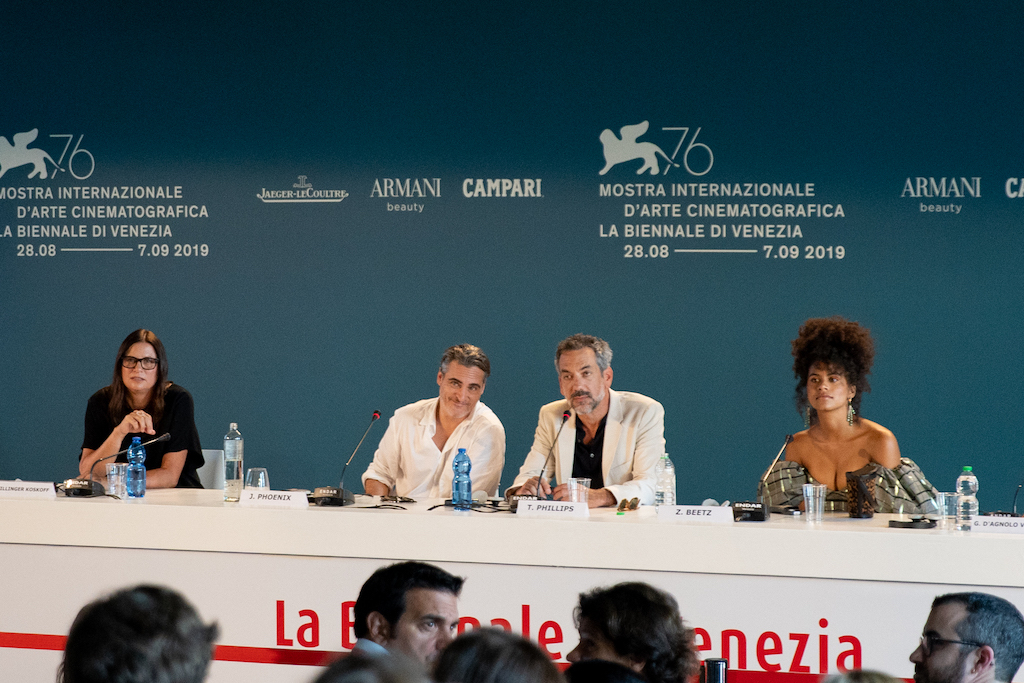
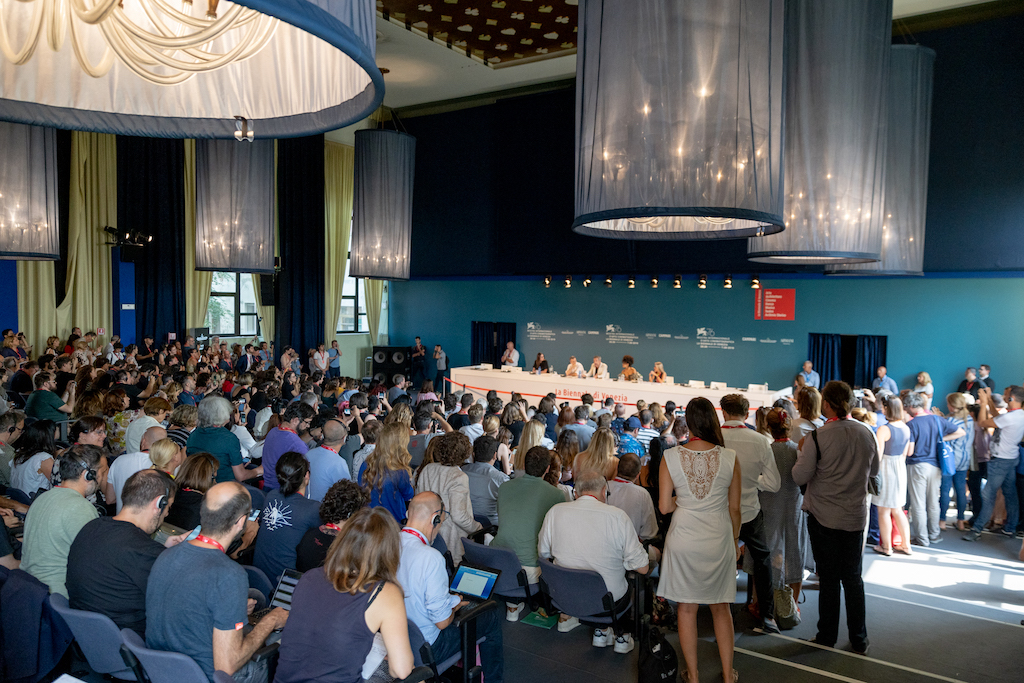
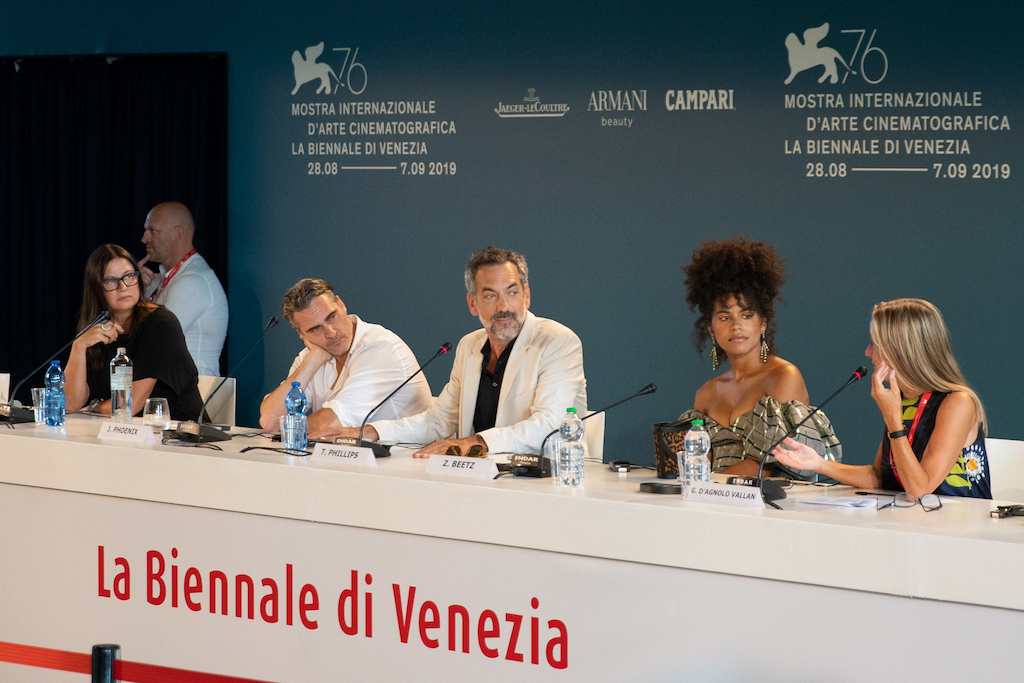
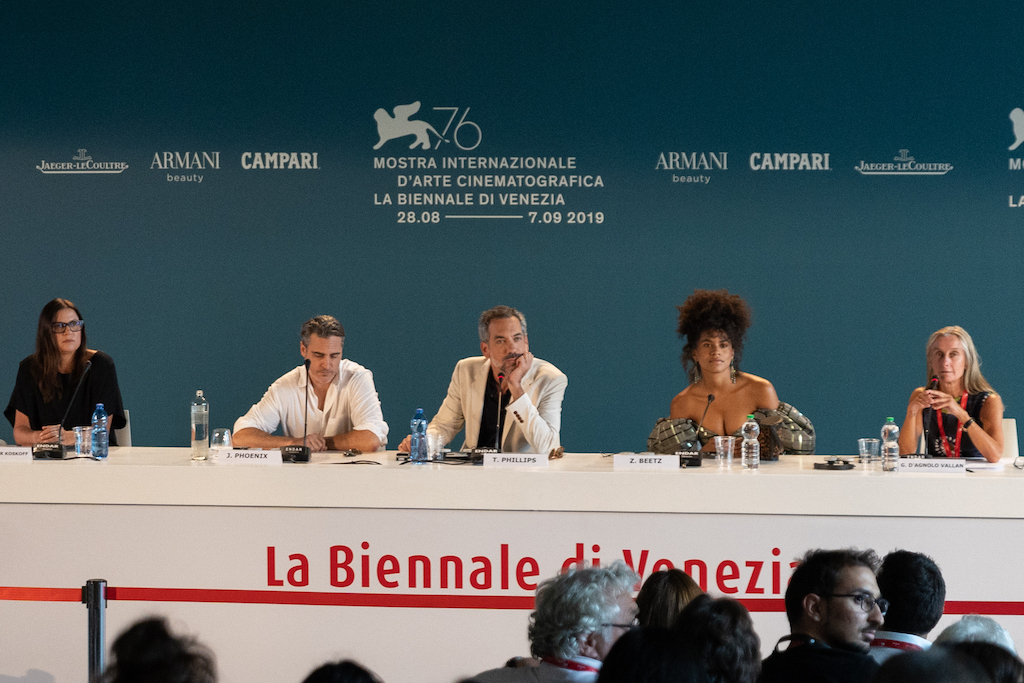
























Facebook
Twitter
Instagram
YouTube
RSS